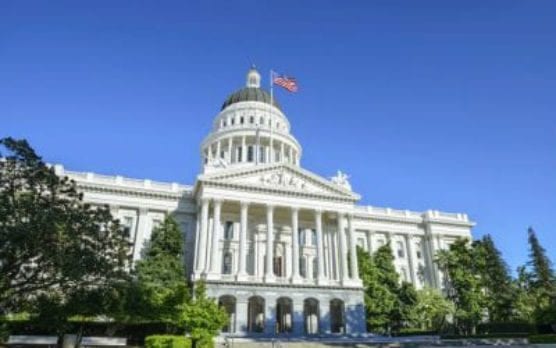The NIL Mess Part Two: How Feckless Legislators Created A Lawless Landscape
The NIL Mess Part One: How Brett Kavanaugh Set The Wheels In Motion With One Concurring Opinion
I often wonder if anybody actually read the legislation that set off the Name, Image, and Likeness fiasco through college sports.
On September 30th, 2019, California governor Gavin Newsom signed the “Fair Pay To Play Act.”
“This bill would prohibit California postsecondary educational institutions except community colleges, and every athletic association, conference, or other group or organization with authority over intercollegiate athletics, from providing a prospective intercollegiate student athlete with compensation in relation to the athlete’s name, image, or likeness,” it reads, “or preventing a student participating in intercollegiate athletics from earning compensation as a result of the use of the student’s name, image, or likeness or obtaining professional representation relating to the student’s participation in intercollegiate athletics. The bill also would prohibit an athletic association, conference, or other group or organization with authority over intercollegiate athletics from preventing a postsecondary educational institution other than a community college from participating in intercollegiate athletics as a result of the compensation of a student athlete for the use of the student’s name, image, or likeness.”
It goes on to require that California athletes to require representation from the state of California if they wanted to take advantage of NIL deals (read: sports agents), and that nothing would be put into law until 2023. It also added: “It is the intent of the Legislature to monitor the National Collegiate Athletic Association (NCAA) working group created in May 2019 to examine issues relating to the use of a student’s name, image, and likeness and revisit this issue to implement significant findings and recommendations of the NCAA working group in furtherance of the statutory changes proposed by this act.”
The legislation didn’t really have any brilliant ideas on how to implement NIL. It had nothing in it except a requirement that athletes are represented by agents, that it was eagerly awaiting what the NCAA had to say on the matter, it forbade student-athletes from signing sponsorship deals that undermine their school’s existing endorsement contracts, that it was going to require the Chancellor of California community colleges to take valuable time and resources to study what NIL opportunities exist for California community college members, and…. that’s it.
For most of the last 100 years, the thought of an amateur, college athlete needing to hire an agent to manage their endorsement deals wasn’t even a passing thought. If an athlete had representation, and Lucky Strike Cigarettes were paying them a salary, they were professionals and thus ineligible to play college sports. It didn’t even need to be said. It was self-evident.
But California SB-206 changed that. It prohibited collegiate athletes from being prevented from being paid like professionals by outside sources.
In retrospect, it seems to me like a bill that was merely designed to challenge the NCAA’s authority. It’s something that the legislator that proposed the bill, Nancy Skinner (D), basically admitted.
“You know, I’m basically a social-justice advocate who became a legislator,” she said at one point. “And so when it comes to exploitation, whether it’s exploitation of athletes or whoever it is, you know, it’s in my DNA to basically try to right that.”
What was not in her DNA, apparently, was any sort of thought or guidance on how the NCAA, or anyone, could implement this.

NCAA Recognizes The Threat
California bill SB 206 ended up being very popular with legislators. It was passed in both houses, including a 72-0 vote by California’s state assembly. And it’s no wonder: it basically didn’t ask the state of California to do much. It put the burden of implementation of enforcement on NCAA, or in the absence of the NCAA, Congress.
In response to the unanimous vote, the NCAA Board of Governors sent a letter to Governor Newsom, the only individual who could prevent the bill from being signed into law (perhaps only temporarily – his veto likely have been overturned).
“The 1,100 schools that make up the NCAA have always, in everything we do, supported a level playing field for all student-athletes. This core belief extends to each member college and university in every state across the nation,” it read. “California Senate Bill 206 would upend that balance. If the bill becomes law and California’s 58 NCAA schools are compelled to allow an unrestricted name, image and likeness scheme, it would erase the critical distinction between college and professional athletics and, because it gives those schools an unfair recruiting advantage, would result in them eventually being unable to compete in NCAA competitions. These outcomes are untenable and would negatively impact more than 24,000 California student-athletes across three divisions.”
“It isn’t possible to resolve the challenges of today’s college sports environment in this way — by one state taking unilateral action,” it continues. “With more than 1,100 schools and nearly 500,000 student-athletes across the nation, the rules and policies of college sports must be established through the Association’s collaborative governance system. A national model of collegiate sport requires mutually agreed upon rules. We urge the state of California to reconsider this harmful and, we believe, unconstitutional bill and hope the state will be a constructive partner in our efforts to develop a fair name, image and likeness approach for all 50 states.”
It was signed by every single member of the NCAA’s Board of Governors.
The Pac-12, too, weighed in after Gov. Newsom signed the bill into law.
“The Pac-12 is disappointed in the passage of SB 206 and believes it will have very significant negative consequences for our student-athletes and broader universities in California,” they said. “This legislation will lead to the professionalization of college sports and many unintended consequences related to this professionalism, imposes a state law that conflicts with national rules, will blur the lines for how California universities recruit student-athletes and compete nationally, and will likely reduce resources and opportunities for student-athletes in Olympic sports and have a negative disparate impact on female student-athletes.”
Nancy Skinner was dismissive and unimpressed, without proposing any ideas on how to address college sports’ concerns.
“Been there, done that,” she said. “You had your opportunity.”
Did they, though?
SB 206 clearly forced the NCAA’s hand when it came to answering the question of name, image, and likeness. It was proposed in February of 2019, and passed in September of the same year. The NCAA formed a committee to look at the issue. You can argue that they maybe should have acted a lot sooner, but there was no doubt that the NCAA was taking it seriously and trying to move on the issue.
And the NCAA’s conclusion in September – correctly, as it turned out – was to make a plea for time to come up with a national solution on how to do this. Clearly, in retrospect, this was unprecedented territory that was going to require a 50 state solution, not just a one state solution, whether through granting the NCAA some special power or through Congressional action.
Yet multiple state legislatures made the same responsibility-free vote to give the athletes this benefit with no national infrastructure on how to implement or police it. Again, for state legislatures, it was basically a cost-free vote dumping the responsibility to the NCAA, or possibly Congress.
If the NCAA had a formal antitrust exemption to police Name, Image and Likeness, they could then craft a policy to make some rules of the road and an enforcement mechanism to prevent it from becoming “pay for play”.
But the members of the NCAA’s board seemed keenly aware that what limited antitrust protection they had was on very shaky ground. It would still be several years before the Supreme Court’s 9-0 ruling against the NCAA in the Alston case, with additional threats against the NCAA from Brett Kavanaugh in his concurring opinion, but the NCAA Board of directors seemed to grasp better than anybody that any action they attempted to make in this area would be, at best, hit with a lawsuit as soon as they tried it.
With few options, the NCAA ended up having to head to Congress, where Sen Cory Booker (D-NJ) was waiting for them.

Congress Doesn’t Help
“We think that this is the right opportunity,” Booker said, “where we have a lot of leverage to get forward an athlete-centered proposal that can stop the exploitation, ensure their safety, expand their educational opportunities and frankly help them actually share in some of the revenue that’s being created by their work.”
Cory Booker, a former tight end at Stanford, has a dim view of the NCAA.
“I came to see during my playing days,” he wrote in Sports Illustrated, “and in the years since, that the NCAA is an exploitative, de facto for-profit industry that takes advantage of college athletes, endangers their health and safety, robs many of them of their peak earning years, undermines their promise of a college education and often leaves them injured with a lifetime of out-of-pocket medical bills and no support to pay them.”
Coming from this worldview, it’s no wonder that Sen. Booker didn’t have any solutions towards how the NCAA, or anyone, can police NIL.
“I do not have faith that the NCAA can be trusted to make the changes necessary,” he said in the same article. “Not only is the NCAA financially incentivized not to upset the status quo, it now also wants Congress to grant it even more power by enacting a national standard to preempt the laws of many state governments that have recently begun seeking more fairness for college athletes.”
Given his public disdain for the NCAA, it seems unlikely that he will be for any addition to the NCAA’s ability to manage NIL through an antitrust exemption, which would need to be approved by Congress.
Booker has proposed his own “College Athlete Bill of Rights” bill in the Senate, S.5062. In it he has proposed ideas for revenue sharing for athletes, guaranteed medical care, and other protections he feels are good for the athletes.
Booker’s concern for student-athletes is genuine, as his personal story will attest. However, like Skinner, he had proposed nothing to change the current, immediate landscape of NIL except as a way to further his overall plan of a sweeping bill of athlete bill of rights. And like many Democratic bills, S.5062 is currently sitting in the Judiciary committee, awaiting action on his all-or-nothing bill. So Senator Booker’s actions attempting to limit or change how NIL is implemented remain so.
Asking a sweeping bill to quickly pass a dysfunctional, divided, fiercely partisan Congress is difficult even in the best of times. But that was always going to be where the NIL question ended up. Basically, it was going to become a referendum on the NCAA’s governance. What should they monitor and police? Should Congress or the Federal Government be doing some, or all, of what the NCAA is currently doing? What is the NCAA’s role, and where does that begin and end? Do the schools have a right to self-governance?
These questions have been asked for the last fifty years, with no definitive answers. But that doesn’t take away from the immediate need to do something about NIL spiraling out of control.

The Aftermath
It’s unclear to me as to whether the motivation behind the proposal of bills California SB 209 and S. 5062 was to try to right what some people think is a historic wrong, or merely to cynically challenge the NCAA’s authority on regulating anything and setting rules about college sports.
What is fairly clear, though, is that the folks that proposed this legislation didn’t adequately think about the beast they were going to unveil on the world, especially after the Supreme Court laid waste to the wafer-thin vote of confidence in the need for the NCAA to set rule.
By not even trying to come up with a workable solution, Nancy Skinner created a new athlete “right” without any way to control it. There was nothing in her legislation, or amendments to her legislation, to prevent “fan collectives” to get together and effectively pay athletes to attend schools.
By tying the overall solution to a sweeping, NCAA-challenging “athlete bill of rights”, Booker has ensured that Congress will continue to sit on its hands and debate while athletes have to pay agents to navigate which NIL actors are fans, businesspeople, or crooks. Some of those agents, furthermore, also could be crooks.
Any fix to the NIL fiasco that is now upon us will have to have Skinner and Booker acknowledge that there are problems with the status quo, and make some sort of effort to rein them in at the state and federal level. Their current silence, as NIL collectives have gutted college sports, is deafening.

Chuck has been writing about Lehigh football since the dawn of the internet, or perhaps it only seems like it. He’s executive editor of the College Sports Journal and has also written a book, The Rivalry: How Two Schools Started the Most Played College Football Series.
Reach him at: this email or click below:

2 thoughts on “The NIL Mess Part Two: How Feckless Legislators Created A Lawless Landscape”